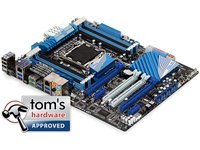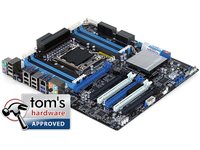Ultimate X79? Five $320+ LGA 2011 Motherboards, Reviewed
Our flagship motherboard comparison announcement was answered with an interesting selection of models, along with a bunch of “not ready yet” responses. Today we examine a few samples from companies bold enough to step up to the plate during launch week.
Which High-End X79 Motherboard Is Best?
Our highest-priced X79 motherboard comparison was intended to highlight the feature sets of over-the-top products, with price being used only as a tiebreaker should any two products emerge as best-of-the-best. So, where are the flagship products?
It appears that everyone was caught off-guard by minor changes between the C0-stepping processors they received during the summer and C1-stepping products that Intel used for the launch. Of the participants, it appears Asus had the quickest firmware turnaround. Everyone knew that we'd use C1 silicon to test, and it makes complete sense that they might not want firmware teething issues to affect their highest-priced parts.
Though we had a reasonably broad selection of candidates, firmware issues left us considering only the two products that came closest to our expectations. Asus’ P9X79 WS had the best performance, best overclocking, lowest power consumption, and greatest number of expansion slots. Meanwhile its P9X79 Deluxe followed closely behind the WS version, but added a bunch of lifestyle-oriented features like Bluetooth, Wi-Fi, and a greater number of USB 3.0 rear-panel ports (even though several ports share bandwidth). The added features are surely worth a little more than the miniscule differences in performance. And yet both boards are priced the same.


Torn between the best board and the board with the most to offer, we decided to give both products our “Approved” award and let each buyer independently determine which of these is more deserving of the ultimate honor: a purchase.
Get Tom's Hardware's best news and in-depth reviews, straight to your inbox.
Current page: Which High-End X79 Motherboard Is Best?
Prev Page X79 Overclocking